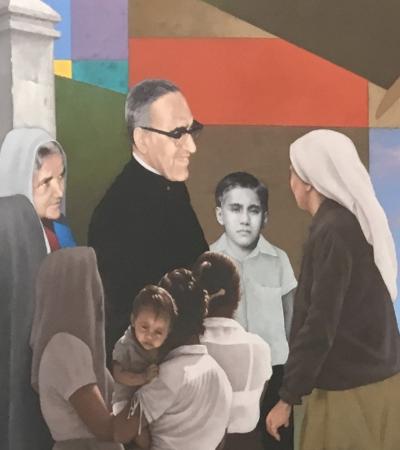Romero and the Practice of Catholic Social Teaching (VIRTUAL)

"Óscar Romero, Catholic Social Teaching, and Land Reform" by Matthew Philipp Whelan, St Andrews Postdoctoral Research Fellow in Theology & Science, Baylor University
My chapter focuses on Romero’s involvement in the reform of Salvadoran agriculture and the conflicts related to the concentration of landholding. The dispossession of the peasantry that accompanied the concentration of land – an unexpected consequence of nineteenth-century liberal enclosure movements – caused social unrest in El Salvador throughout the twentieth century, particularly in the late 1970s while Romero was archbishop. Central to this unrest was the clamor for reforms designed to facilitate the peasantry’s access to land and to dignified working conditions, and the increasingly brutal resistance to these efforts. Against this backdrop, I examine Romero’s rationale for supporting land reform, beginning with his work as bishop of Santiago de María and through his death. I argue that Romero’s advocacy for justice in the distribution of agricultural land takes its principal bearings from Catholic Social Teaching, which helps us to see how that advocacy is also part of a more comprehensive politics, which I call a politics of common use. Finally, I look at why the practice of this politics led to suffering and death for Romero and for many others in El Salvador and beyond. (Click here for the full abstract.)
"Radical Nonviolence: Romero, Catholic Social Teaching, and Racism" by Rubén Rosario Rodriguez, Professor of Systematic Theology, Saint Louis University
In his pastoral letters Romero defended revolutionary violence as legitimate self-defense in the context of authoritarian repression, while also proclaiming that the only truly Christian response to political violence is nonviolence. In the US context, Romero's legacy has not always proven a comfortable conversation partner for black liberation theology, given the latter's embracing of revolutionary violence. As James H. Cone stated in Black Theology and Black Power (1969), "The revolution which Black Theology advocates … [means] confronting white racists and saying: 'If it's a fight you want, I am prepared to oblige you.' This is what the black revolution means." Whereas Archbishop Romero consistently preached nonviolence from the pulpit: "the only violence permissible in the Gospel is to allow yourself to be killed for the sake of another." By exploring the role of legitimate liberating violence in Romero's pastoral letters, a position firmly rooted in Catholic Social Teaching, through a critical engagement of Bryan Massingale's critique of Catholic Social Teaching on racism, I hope to find common ground between Romero and Cone's understandings of revolution in the context of unrelenting racial injustice.
Participation is limited to a small number of faculty and graduate students. Please register to be considered for participation. Preparation materials will be sent to confirmed participants prior to the session.





